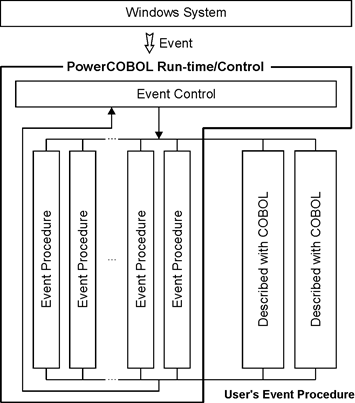Windows applications rely on events. Events are the expected results of simple user actions. For example, at the click of a button, users expect sub-windows to open with choices from menus, check boxes, or list boxes.
Dragging the mouse across a certain portion of the screen will generate an event stating the mouse has been dragged over this area.
Based on the cursor position in the window, another click may be expected to cause colors to change, the window to close, or one of many other Windows events.
Programmers using a traditional, third-generation programming language have to write code to initiate such events. However, in PowerCOBOL the support logic for event-driven programming (standard Windows events) is built-in, as shown in the following figure, to allow programmers to focus their attention on other tasks.
Figure 1.4 Event-driven programming

As you may be able to deduce from Figure 1.4, PowerCOBOL vastly simplifies the task of writing complex GUI applications. Instead of being forced to write a large and complex application, your development task is easily broken down into writing individual event procedures.
PowerCOBOL puts all of these event procedures together properly, thus relieving you of a great deal of application design and management.